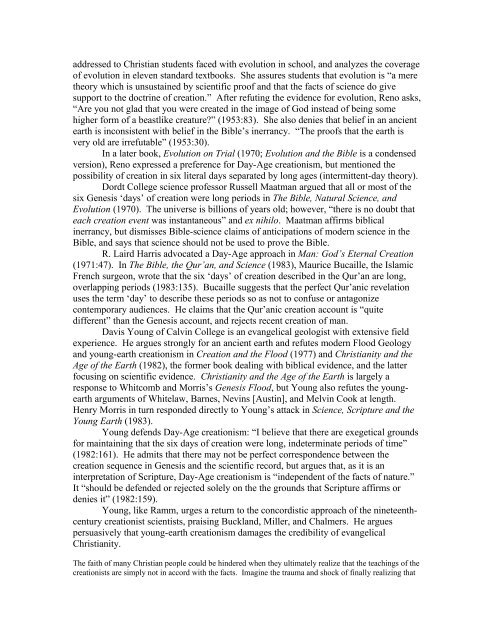Creationism - National Center for Science Education
Creationism - National Center for Science Education
Creationism - National Center for Science Education
You also want an ePaper? Increase the reach of your titles
YUMPU automatically turns print PDFs into web optimized ePapers that Google loves.
addressed to Christian students faced with evolution in school, and analyzes the coverage<br />
of evolution in eleven standard textbooks. She assures students that evolution is “a mere<br />
theory which is unsustained by scientific proof and that the facts of science do give<br />
support to the doctrine of creation.” After refuting the evidence <strong>for</strong> evolution, Reno asks,<br />
“Are you not glad that you were created in the image of God instead of being some<br />
higher <strong>for</strong>m of a beastlike creature?” (1953:83). She also denies that belief in an ancient<br />
earth is inconsistent with belief in the Bible’s inerrancy. “The proofs that the earth is<br />
very old are irrefutable” (1953:30).<br />
In a later book, Evolution on Trial (1970; Evolution and the Bible is a condensed<br />
version), Reno expressed a preference <strong>for</strong> Day-Age creationism, but mentioned the<br />
possibility of creation in six literal days separated by long ages (intermittent-day theory).<br />
Dordt College science professor Russell Maatman argued that all or most of the<br />
six Genesis ‘days’ of creation were long periods in The Bible, Natural <strong>Science</strong>, and<br />
Evolution (1970). The universe is billions of years old; however, “there is no doubt that<br />
each creation event was instantaneous” and ex nihilo. Maatman affirms biblical<br />
inerrancy, but dismisses Bible-science claims of anticipations of modern science in the<br />
Bible, and says that science should not be used to prove the Bible.<br />
R. Laird Harris advocated a Day-Age approach in Man: God’s Eternal Creation<br />
(1971:47). In The Bible, the Qur’an, and <strong>Science</strong> (1983), Maurice Bucaille, the Islamic<br />
French surgeon, wrote that the six ‘days’ of creation described in the Qur’an are long,<br />
overlapping periods (1983:135). Bucaille suggests that the perfect Qur’anic revelation<br />
uses the term ‘day’ to describe these periods so as not to confuse or antagonize<br />
contemporary audiences. He claims that the Qur’anic creation account is “quite<br />
different” than the Genesis account, and rejects recent creation of man.<br />
Davis Young of Calvin College is an evangelical geologist with extensive field<br />
experience. He argues strongly <strong>for</strong> an ancient earth and refutes modern Flood Geology<br />
and young-earth creationism in Creation and the Flood (1977) and Christianity and the<br />
Age of the Earth (1982), the <strong>for</strong>mer book dealing with biblical evidence, and the latter<br />
focusing on scientific evidence. Christianity and the Age of the Earth is largely a<br />
response to Whitcomb and Morris’s Genesis Flood, but Young also refutes the youngearth<br />
arguments of Whitelaw, Barnes, Nevins [Austin], and Melvin Cook at length.<br />
Henry Morris in turn responded directly to Young’s attack in <strong>Science</strong>, Scripture and the<br />
Young Earth (1983).<br />
Young defends Day-Age creationism: “I believe that there are exegetical grounds<br />
<strong>for</strong> maintaining that the six days of creation were long, indeterminate periods of time”<br />
(1982:161). He admits that there may not be perfect correspondence between the<br />
creation sequence in Genesis and the scientific record, but argues that, as it is an<br />
interpretation of Scripture, Day-Age creationism is “independent of the facts of nature.”<br />
It “should be defended or rejected solely on the the grounds that Scripture affirms or<br />
denies it” (1982:159).<br />
Young, like Ramm, urges a return to the concordistic approach of the nineteenthcentury<br />
creationist scientists, praising Buckland, Miller, and Chalmers. He argues<br />
persuasively that young-earth creationism damages the credibility of evangelical<br />
Christianity.<br />
The faith of many Christian people could be hindered when they ultimately realize that the teachings of the<br />
creationists are simply not in accord with the facts. Imagine the trauma and shock of finally realizing that

















